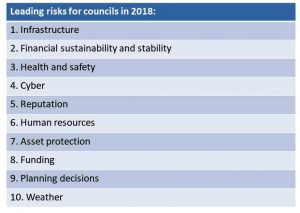Infrastructure, financial sustainability and health and safety are the greatest risks for local government, according to a new analysis that finds many councils are failing to adequately prepare.
More than half of all councils are failing to execute practices to “rein in” some of their greatest risks, including human and environmental issues, according to Aon’s annual risk report on local government.
According to the global professional services firm’s 2018 Local Government Risk Report, a fifth of councils have no process at all for risk profiling, with most relying on their appointed insurance broker.
Risk profiles would ensure councils have a comprehensive understanding of risks within their unique risk profile, the firm says.
The report said that “forward thinking” councils are engaging in data-backed risk profiling, gap analysis and developing and implementing strategies to enhance employee engagement and protect the wellbeing of workers.

“They measure and manage their risk appetite and test the market for the most effective coverage. Avoiding overbuying frees financial resources to employ into council programs and projects for the benefit of the community,” the report said.
Aon’s analysis ranked local government in the bottom of all sectors analysed, finding only 23 per cent of councils tender for insurance and risk management.
Councils that proactively manage risks and employ best-practice claims management are viewed more favourably by insurers and achieve more “financial benefit”, the report said.
Paul Crapper, Aon’s head of local government, said that a fifth of councils aren’t auditing their workplace health and safety (WHS) requirements.
“The big issue for a lot of councils is they have the same level of compliance requirements as other councils but may not have financial resources or people resources to adequately audit WHS on a regular basis,” Mr Crapper told Government News.
Key risks revealed
The report revealed that infrastructure remains the greatest issue for local government, followed by financial sustainability. Health and safety, cyber security and reputational issues were the next big concerns for local governments, the analysis found.

Cyber security jumped four places as a risk for councils this year, only entering the top 10 in last year’s report, while reputational concerns are being exacerbated by social media, the report said.
Mr Crapper said that the introduction of mandatory reporting by the Federal Government has increased awareness among councils of the risks posed by cyber threats.
“Councils are starting to understand and recognise cyber as a risk exposure they need to mitigate,” he said.
Funding squeezes and rate capping, particularly in NSW and Victoria, as well as increasing ratepayer expectations have placed pressure on councils and ensured that infrastructure and financial sustainability are key risks, the report says.
“Not surprisingly the unrelenting challenge to do more with less ensured that the financial challenges of infrastructure, financial sustainability and stability lead the list of risks for local government,” the report said.
Growth prompts infrastructure risk
Mr Crapper said that the rate of municipal growth is another key factor causing infrastructure to take the lead as the greatest risk for councils.
“Councils going through such high levels of municipal growth struggling to keep up with delivery of all the infrastructure required for that level of growth,” he said.
A “widening asset renewal gap” is also placing financial pressure on councils, as councils seek to implement new infrastructure whilst maintaining old infrastructure, the report said.
The report also flagged issues relating to human resources, asset protection, funding, planning decisions and weather events as among the top 10 risks for councils.
The Aon findings come as the Victorian Auditor General completes a performance audit looking at insurance risks, including whether councils are “prudently managing their insurable risks.”
Comment below to have your say on this story.
If you have a news story or tip-off, get in touch at editorial@governmentnews.com.au.
Sign up to the Government News newsletter.




Leave a Reply